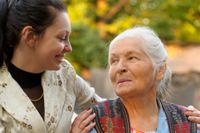
Sundowning is a symptom common among individuals with Alzheimer’s or dementia that generally involves agitation and confusion beginning in the late afternoon and persisting into the evening. Providing elder care for a loved one who experiences this condition can be challenging. Use the helpful guide below to make handling these episodes easier.
How to Help a Loved One Cope With Sundowning
1. Establish a Routine
A constantly shifting schedule is often a source of stress for seniors with cognitive issues. Consistency provides comfort and clarity that may put them at ease. Establish daily and weekly routines and deviate from them as little as possible. Having established meal times, for instance, will cultivate a sense of security. Setting traditions that a senior can look forward to will also allay confusion and concern, such as a weekly family dinner or church service attendance. When changes can’t be avoided, try to implement them incrementally to prevent unneeded strain.
2. Help Your Family Member Stay Active
 Sundowning is often associated with sleep disturbances. If your loved one experiences insomnia, look for ways to boost activity during the day, as this will help them use enough energy to feel tired and develop a regular sleep schedule. A daily walk or two often proves beneficial. Gentle stretching and static poses, such as tai chi, may also be effective and are easy to perform at home. Limit daytime naps as much as possible, as these may inhibit your loved one’s ability to get a good night’s sleep. No matter what activities you have your elderly relative try, ensure their basic needs, such as hunger, thirst, and mental stimulation, are met; otherwise, they may be more prone to agitation.
Sundowning is often associated with sleep disturbances. If your loved one experiences insomnia, look for ways to boost activity during the day, as this will help them use enough energy to feel tired and develop a regular sleep schedule. A daily walk or two often proves beneficial. Gentle stretching and static poses, such as tai chi, may also be effective and are easy to perform at home. Limit daytime naps as much as possible, as these may inhibit your loved one’s ability to get a good night’s sleep. No matter what activities you have your elderly relative try, ensure their basic needs, such as hunger, thirst, and mental stimulation, are met; otherwise, they may be more prone to agitation.
3. Practice Self-Care
When your loved one has an episode, you need to stay calm, reassure them, and keep them safe if they need to pace about. When you’re exhausted from juggling many responsibilities, you may find it’s harder to provide the patience and attentive care your loved one needs. Make sure you’re eating right, resting, and taking breaks to engage in activities you enjoy. Enlist other family members to help and talk to your loved one’s physician about additional steps you can take.
If the situation isn’t tenable, don’t feel you have to handle it alone; contact an assisted living facility for help. People experiencing cognitive decline often have advanced elder care needs that are best addressed in a professional setting. Waynesboro Manor offers kind and compassionate elder care to residents of Augusta County, VA. Seniors receive 24/7 monitoring by highly trained and caring staff. Their staff also goes above and beyond to enrich the lives of residents by offering structured schedules, fun activities, nourishing meals, and opportunities for socialization. Call (540) 942-2250 today for more information. Visit the website to schedule a tour of this facility.
About the Business
Have a question? Ask the experts!
Send your question

